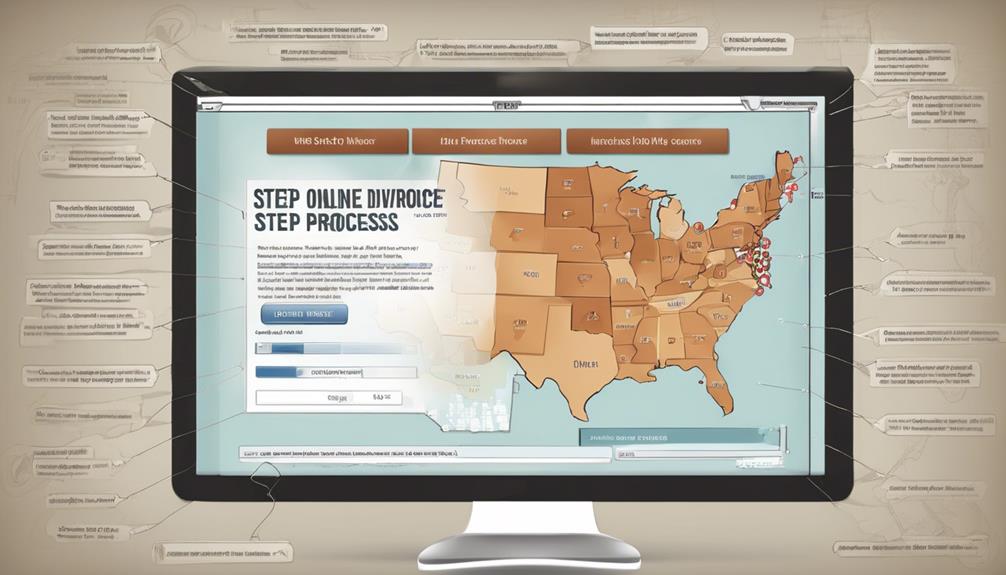Are you finding it difficult to navigate the complexities of divorce while still having feelings for your partner?
It's a common challenge that many face, but there are essential strategies that can help us through this tough period.
Let's explore practical tips that can provide guidance and support during this emotionally turbulent time.
Key Takeaways
- Acknowledge and accept your feelings of love post-divorce.
- Seek support from a strong support system.
- Prioritize self-care and emotional well-being.
- Establish healthy communication boundaries with your ex-spouse.
Acknowledge Your Feelings
Acknowledging the persistence of love for your ex-spouse post-divorce is a crucial step in the healing process. It's completely normal to still have feelings of love even after the finalization of a divorce. These emotions can be complex and confusing, but it's essential to acknowledge them rather than suppress or ignore them. Understanding that it's okay to still love your ex-spouse doesn't mean you have to act on those feelings or reconcile the relationship. Love can exist independently of the decision to move forward separately.
Recognizing that loving someone doesn't always align with a healthy partnership is a significant realization. It's essential to accept these feelings as part of your healing journey. Seeking support from friends, family, or a therapist can provide a safe space to process these emotions and gain clarity on how to navigate the complexities of still loving your ex during a divorce. Remember, acknowledging your feelings is a sign of strength and a crucial step towards moving forward in a healthier way.
Seek Support From Loved Ones

Seeking support from loved ones is crucial during the challenging process of divorce, providing emotional comfort and understanding as you navigate your feelings for your ex-spouse. When surrounded by a supportive family and friends, you can find solace in their presence and shared experiences. Here are four key ways your loved ones can assist you during this difficult time:
- Emotional Comfort: Your family and friends offer a safe space for you to express your emotions freely without judgment.
- Understanding and Empathy: They can empathize with your struggles and provide a listening ear, making you feel less alone in your emotions.
- Encouragement and Advice: Your support system can offer words of encouragement and valuable advice as you navigate the complexities of divorce.
- Creating Positive Interactions: Engaging in activities with your loved ones can bring moments of joy and distraction from the emotional turmoil, contributing to your emotional well-being and resilience.
Building a strong support system is vital for maintaining your emotional health and finding strength as you progress through the divorce process while still holding love for your former partner.
Prioritize Self-Care
As we navigate the challenging process of divorce while still holding love for our former partner, prioritizing self-care becomes essential for maintaining our mental and emotional well-being.
Coping with divorce can bring about intense emotional pain, making it crucial to focus on our mental wellness. Engaging in self-care activities such as exercise, meditation, or pursuing hobbies can significantly reduce stress levels and promote self-love during this difficult time.
Taking moments for introspection allows us to heal and grow, even when feelings for our ex-partner linger. Seeking therapy or joining support groups can provide valuable outlets for addressing conflicting emotions and navigating the complexities of divorce.
Setting boundaries with our ex-partner while emphasizing self-care can help us maintain emotional stability and move forward positively. Remember, investing in our self-care isn't selfish; it's a necessary step in the healing process towards a brighter future.
Set Boundaries for Healthy Communication

To navigate the complexities of divorce while still harboring feelings of love, it's crucial to establish clear boundaries for healthy communication with your ex-partner. Setting these boundaries can help create emotional distance and reduce potential conflicts that may arise during interactions. By clearly defining what topics are off-limits for discussion, you can prevent reopening emotional wounds and maintain a sense of stability. Healthy communication boundaries not only promote self-care and emotional well-being but also aid in the process of finding closure and moving forward while still navigating the complexities of love.
- Limit communication to essential matters: Focus on practical issues only to avoid unnecessary emotional entanglements.
- Define off-limits topics: Clearly outline what topics aren't up for discussion to protect your emotional well-being.
- Maintain consistency: Be firm in upholding these boundaries to ensure a healthy communication dynamic.
- Seek support when needed: Don't hesitate to reach out to a therapist or support group to help you navigate setting and maintaining these boundaries effectively.
Focus on Personal Growth
Engaging in personal growth post-divorce involves exploring new interests, discovering aspects of oneself, and embarking on a journey towards self-improvement. It's a period where self-discovery and healing take center stage. By focusing on self-improvement, we can gradually move forward and create a new chapter in our lives. Setting personal goals and embracing change are pivotal in this process of empowerment and self-reflection.
During this time, it's crucial to engage in activities that bring joy and fulfillment. Whether it's picking up a new hobby, learning a skill, or simply taking time for self-care, each step contributes to our personal growth. Exploring interests that were perhaps set aside during the marriage allows us to rediscover ourselves and our passions. By dedicating energy to personal growth, we pave the way for a brighter future filled with self-empowerment and a deep sense of fulfillment.
Frequently Asked Questions
How Do You Deal With a Divorce When You Still Love Them?
We acknowledge the challenge of navigating a divorce while still loving the other person. It's important to prioritize self-care, seek support, set boundaries, allow yourself to grieve, and work towards acceptance to heal and move forward.
What Is the Walkaway Wife Syndrome?
We understand the Walkaway Wife Syndrome as a sudden decision by a wife to end the marriage, often due to feeling emotionally detached or unappreciated. Recognizing signs and addressing communication breakdowns can help prevent such situations.
Who Moves on Faster After Divorce?
We understand that moving on after divorce varies. Women often find closure faster due to support networks. Men might take longer, suppressing emotions. Factors like age and readiness affect healing. Everyone's journey is unique.
How Do You Love a Man Going Through a Divorce?
We understand the challenges of loving a man going through divorce. Supporting him emotionally, communicating openly, respecting his space, and seeking guidance are key. Together, we can navigate this difficult time with empathy and strength.
Can Women Use the Same Coping Strategies as Men When Going Through Divorce?
Yes, women can utilize the essential coping strategies men use when going through divorce. These strategies, such as seeking support from friends and family, maintaining a healthy lifestyle, and finding constructive outlets for emotions, can be beneficial for anyone navigating the challenges of divorce, regardless of gender.
Conclusion
In the midst of a divorce when love still lingers, it's vital to navigate the storm with grace and strength. Remember, the sun will shine again.
Embrace the journey of healing, growth, and self-discovery. Lean on your support system, prioritize self-care, and set boundaries for a brighter tomorrow.
Let your heart mend, and bloom anew like a resilient flower after a storm. You aren't alone, and you'll emerge stronger from this chapter.










